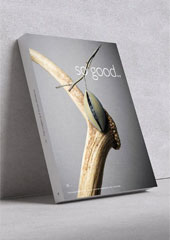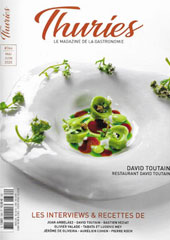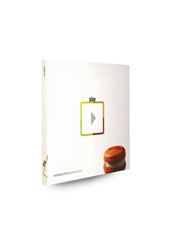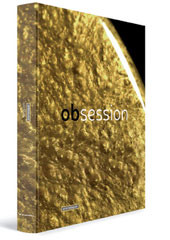Articles
Harvard brings together foodies, physicists
Harvard Course 'Science and Cooking'
News - Articles
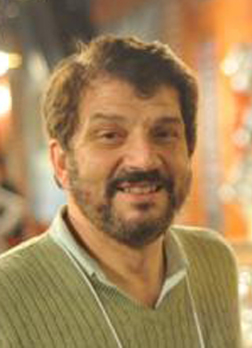
CAMBRIDGE - Just as we are getting used to saying molecular gastronomy, the chefs at its
forefront now prefer the expression "avant garde cuisine" or "modernist cuisine".
Whatever you call it, it was celebrated this semester at the Harvard course and
public lecture series "Science and Cooking".
This fall 13 of the world's most accomplished chefs made a pilgrimage to the university
to hold forth on how the newest food science informs their creations.
It was a dream team of speakers from this country and Europe:
chefs David Chang, Dan Barber, Jose Andres, Wylie Dufresne; White House pastry chef Bill Yosses;
visiting Catalan chef Ferran Adria, and several of his colleagues.
The course filled immediately and outside wonks were swooning.
For each public lecture, halls and teleconferenced overflow-halls were filled with the eager
fooderati (bloggers, academics, chefs, fans). Thousands more tuned in via live Internet video.
The result is mountains of content and commentary on our understanding of exotic haute-cuisine dishes,
which include pearls (the method is called spherification) and traditional browned meat (the
"Maillard reaction"). To date, the talks have been written about on more than 3,000 blogs. And the
science is no longer esoterica. Working chefs, taking a rare night off, were also in the auditorium
taking notes.
Initially the series had few believers, but one visionary. Meet Otger Campas, a postdoctoral fellow
at the Harvard School of Engineering and Applied Sciences. He studies the properties of biological
physics and "soft matter", and is a bit of an amateur cook. Soft matter, he tells me, includes
shampoo, the human body, kid's squishy toys, and, as it turns out, nearly all food. Campas's first
name, pronounced "oo-tjer", has become a shibboleth of sorts in some Boston food circles.
One evening in 2008, Campas was at his modest shared postdoc "office" (it's really a work bench)
watching an instructional DVD by Ferran Adria, the world's most awarded chef and a fellow Catalonian.
An idea struck. "Harvard has guest lecturers come all the time", recalls Campas. "We can invite
Adria to talk about the physics of food".
Campas ran down the hall to David Weitz, a professor of physics and applied physics, who tried to
temper his expectations. "Do you know who Ferran Adria is? He's never going to come to Massachusetts".
Campas recounts his professor's skepticism with a friendly laugh now.
But he wrote to Adria anyway.
The result was like a Craigslist date where each person is amazed the other is interested. Adria
enthusiastically wrote back the same day. He traveled to Harvard for two days of speaking and a
blockbuster public lecture. In the final days of the visit, Campas, with Harvard fully behind him now,
suggested that Adria spearhead a course in the physics department in 2010. The chef quickly accepted.
In return, Adria got Harvard physicists to consult - on-site in Catalonia - on some of his most
pressing culinary problems. He wanted to create edible foams that are dry on the outside but moist on
the inside, and warm ice cream that stays solid until it melts in your mouth.
And so the course turned into a phenomenal success from all perspectives. For avant garde chefs (to
use Adria's preferred term), the process of developing dishes is more dream-and-try than apply-known-
scientific-principles. "Scientists try to understand things", explains Weitz. "But chefs like Adria
can create without understanding. They give us beautiful problems to solve. And they currently solve
them not by understanding, but by making it work".
The cuisine may be reaching the limits of what informed guesswork can create, and scientists are
excited about exploring these unusual culinary problems. Now that the course is over, dozens of other
universities have inquired about offering one.
The physicists see a growing interest in their science from the public, which is gratifying. Weitz
points to the auditorium of excited foodies and asks, "Does the public normally cheer when they see
an equation"?
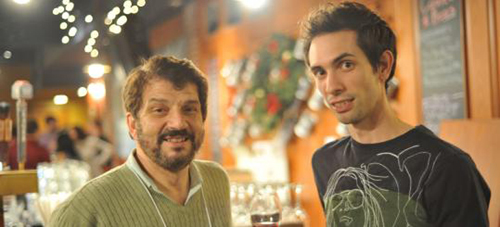 |
|
| Harvard physics professor David Weitz (left) and Otger Campas, a postdoctoral fellow at the Harvard School of Engineering and Applied Sciences. (Connie Wilking/Harvard Seas) |
Source: Ike DeLorenzo for Globe Newspaper


